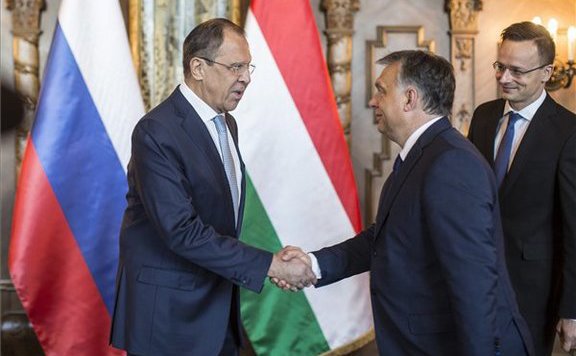By Modeste Schwartz.
Maybe not just for that. Most Romanian observers refuse to see mere coincidence in the fact that the triumphant return of Johannis after his debut in the Washington silent film industry also marked, nearly to the day, the beginning of the most serious government crisis the country has experienced since the appointment, in early January, of the Grindeanu Cabinet.
The details of this crisis are multiple, complicated, often equivocal – adjectives generally applicable to the political life of a country where ideology is a practically negligible factor in political life, and where nothing, in the institutional and political culture, is made to discourage shameless opportunism and trans-party nomadism. As a rule, Romanian politicians are – like their Western counterparts – selling to the highest bidder, but – unlike their more disciplined Western counterparts – they are available not only for wholesale purchase, but also for purchase by the piece. The only sure thing is that for almost two weeks there has been growing hostility between L. Dragnea, the undisputed leader of the Social Democratic Party which won a comfortable majority in the last election, and Prime Minister S. Grindeanu, also a member of the PSD, but who had had a relatively obscure provincial career until his appointment a little over five months ago; he was then proposed (as a second choice) by Dragnea and approved by Johannis (in case of refusal, the Romanian constitution would have imposed calling for new elections, in which Johannis’ party might have lost even more than it had just done). Now, Grindeanu has started making unfriendly statements about L. Dragnea; the latter has set in motion the machinery of the party, which is now introducing a motion of censure against the Grindeanu government.
Propaganda and counter-propaganda being the basis of Romanian politics, there are, of course, at least two diametrically opposed interpretations of current events, according to the fundamental choice of ascribing the role of the “traitor” (secretly allied to Johannis against the interests of the PSD and Romania) either to Grindeanu (which seems to be the majority option among PSD supporters) or to Dragnea.
The first interpretation says in substance that the choice of Grindeanu (whose links to the Romanian “secret services” under Western control are quite clear) for PM was imposed on Dragnea by Johannis and the Western bosses of the latter. Institutional logic and precedents would have ordered that Dragnea, as the leader of the majority parliamentary coalition, offered himself for the PM position, an option which Johannis refused even before it was mentioned, by announcing (probably unconstitutionally) that he would refuse such a nomination because of the “suspicions of corruption” that would hover over the person of L. Dragnea (see my winter reports on this). Grindeanu would have essentially constituted a microphone and a landmine inserted by the Romanian deep state in this government which, while officially titled the “Grindeanu government”, is notoriously the Dragnea government. By signing, with K. Johannis’ hand, an astronomical package of American weaponry purchases, the Romanian Deep State would have bought the indulgence of the new American administration – at first reticent to collaborate with A. Merkel’s stooges – for its project of taking down the Dragnea-Tăriceanu tandem, i.e. the PSD-ALDE coalition which had been able to form a government in January, just a few days before L. Dragnea and S. Grindeanu left for a visit to … Washington.
This governmental crisis could therefore be the second act of a single campaign aimed at robbing the democratic majority, embodied by the ruling coalition, of its December 2016 victory. The first act – entitled “Romanian Winter” – ended with the failure of the attempted Maidan last February. It might also be the third act, if we consider that in reality the tension between the end of the said Maidan and the beginning of the present governmental crisis has never ceased, but merely migrated to the field of societal struggles in the form a battle skillfully staged around the issue of “gay marriage” between the local (though imported) LGBT lobby and a “Coalition for the Family” wishing to have heterosexuality of marriage enshrined in the Constitution (a coalition which is also curiously well-financed, and not devoid of links with certain American neo-Protestant circles) – a battle whose real stake was, in my opinion, again, to provoke the break-up of the PSD, torn between a social-liberal wing, with moderate acceptance of the LGBT program and a social-patriotic wing resolutely opposed to it (see my analysis about O. Vasilescu).
The second version, conveyed by Grindeanu supporters (and supporters of those PSD MPs who will not vote in support of the censure motion proposed by their own party), asserts instead that the Dragnea-Tăriceanu tandem would now have a secret agreement with Johannis and that with Donald “The Art of the (Arms) Deal” Trump’s discreet blessing, they would prepare to get rid of the “honest and competent” elements of the PSD, so as to perpetuate an oligarchic and corrupt management of the country. In addition to retaking well-known themes of Western propaganda (including the leitmotif of “corruption”), this thesis also runs counter to the Ockham principle, since it requires the assumption of numerous and enormous alliance reversals. Whereas the former interpretation provides at the same time a confirmation of the interpretation of the events of December / January and an explanation for the meteoric rise of S. Grindeanu, who six months ago was still a complete unknown. Finally, the “Grindeanu thesis” implies that not only L. Dragnea, but also, behind him, much of the PSD’s apparatus would be willing to put the party at risk of rupture, thus losing mandates in the next elections, while it is now in power, and enjoying growing social consensus (including many representatives of the Hungarian minority – see below) around its socio-economic measures. Seen from the outside, on the other hand, one might find it bizarre that S. Grindeanu accepts, by order, to sack a successful economic program, which would, moreover, be called to perpetuate its name in the history of the country. But, supposing that the same S. Grindeanu is also a political police agent infiltrated into the ranks of the PSD, it goes without saying that (even in the absence of other, more disturbing secrets) the mere fear of seeing this past made public would be enough to make him accept political seppuku.
Parallel to these events, new, highly compromising recordings appeared, apparently announcing the imminent resignation of Laura Kövesi, who, at the head of the anti-corruption prosecutor’s office, is a key element of the institutional blackmail system meant to guarantee the loyalty of the Romanian political class towards the Western Empire. Depending on who we suspect the sources of the leak might be, the two interpretative tendencies mentioned above also apply to this case: emphasizing the almost personal hostility between Kövesi and Dragnea, Grindeanu’s supporters consider that the CIA sacrifices its own pawns on the altar of a nice weapons sale, thanks to a tripartite reconciliation Dragnea-Johannis-Trump. Dragnea supporters, apparently less quick to draw conclusions, may well suspect the rebellious fringe of internal services (SRI), usually associated with the name of the oligarch S. Ghiţă (currently on the run in Serbia), to be at the origin of these new revelations, so very embarrassing for the Romanian Deep State’s “Mrs. Clean”. Nor can we exclude the hypothesis of retaliation (with, if it is the case, fairly bad timing) of the Dragnea clan in view of Grindeanu’s proven betrayal.
In any case, while the intermediate details of the current palace revolution will continue to elude our perspicacity for much longer, the logic of the cui prodest allows us to clearly describe its origin and likely outcome. What on earth could Johannis – who never had any political existence of his own – possibly negotiate with Trump on behalf of the Reich-Chancellor Merkel, who has recently emerged victorious from the French elections – if not a license to kill in order to restore total submission of her Romanian colony, including the withdrawal of the neo-Keynesian economic program (wage increases) which, at the polls, brought the PSD to power last December, but provoked the non-veiled displeasure of the German predatory capital established in Romania? Whatever his past, Grindeanu, should he withstand the motion of censure, would be obliged to rely on another parliamentary majority, including, besides the mutinous elements of the PSD who support him, pro-Western right-wing parties such as K. Johannis’ PNL and the liberal-libertarian USR, who attempted to overthrow his government in the streets last February – with all the “concessions” needed in such a context.
Independent of the final result of the match, which is not yet known, the most interesting aspect of this crossing of swords is probably the role of “Hungarians” and the management of their image in this debate. Threatened to its right by small nationalist Hungarian parties, and to its left by the absorption / denationalization of its left wing by the USR, the Hungarian minority’s historical party (UDMR in Romanian, RMDSZ in Hungarian) initially considered joining the motion of censure, in exchange for moderate concessions of Dragnea’s PSD to their cultural demands (administrative bilingualism in Transylvania). This temptation immediately gave rise to a cleverly orchestrated outburst of Hungarian-bashing in the chauvinistic sectors of Romanian nationalism, generally controlled by the anti-communist networks of NATO. In a very revealing way, one of the Romanian press bodies most involved in this strategy of tension, the television station DIGI, has as its majority shareholder an ethnically Hungarian Romanian citizen, Z. Teszari (whose personal fortune is estimated at 370 million euros); this outlet, which is usually open to “Transylvanist” messages when they merely reinforce the social racism of a section of Romanian Transylvanian opinion against the “parasites” of extra-Carpathian Romania, has also clearly supported the pro-Western Maidan attempt which failed last February – thus feeding, in many Romanian nationalists, the old phobia of a “Hungarian plot” with a view to the territorial dismantling of Romania. Mission accomplished: the UDMR has just withdrawn its support for the censure motion proposed by the PSD, which probably had to scale back its promises, frightened by the risk of alienating its own supporters in the chauvinist camp. But in passing, it will be possible to verify that – contrary to the beliefs of these chauvinists within the PSD and outside – ethnicity is not the decisive element of the story: deprived of Western support by its recent rapprochement with V. Orbán’s FIDESZ (enormously popular in the Hungarian minority), and consequently structurally set, just like the PSD on the Romanian side of the ethnic barricade, in the situation of having to satisfy its electorate rather than a Western oligarchy that would rather see it dismantled, the UDMR now represents, within the Hungarian minority, the well-understood interests of a popular majority which is loyal to Romania, but wishes to see its cultural rights respected. Z. Teszari, on the other hand, although Hungarian is probably his mother tongue, shares and defends the interests of a comprador oligarchy which, in order to maintain its socio-economic domination in Romania, is ready to step over many corpses, including, if need be, that of the Hungarian minority into which the same Z. Teszari was born. On the Romanian side, symmetrically, we witness the discreet convergence of liberal-libertarian activism (USR) and a xenophobic-nationalist activism (less structured, but clearly audible in the media and visible on the internet), both serving, in fact, the same oligarchic interests – in accordance with the model provided by the LGBT-Hitlerian regime currently in power (with the blessing of the EU and NATO) in Ukraine.
Ed. The censure motion passed on June 21, 2017.




